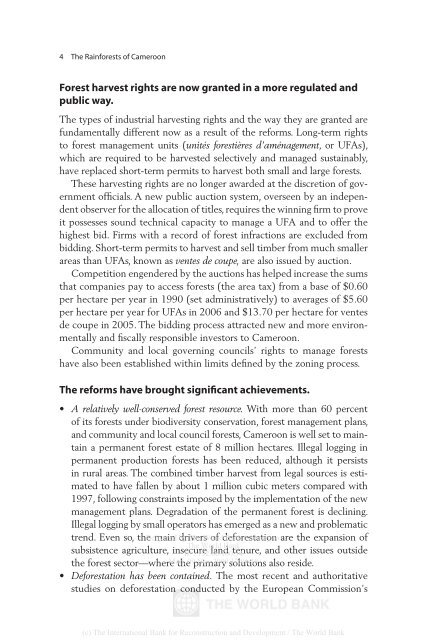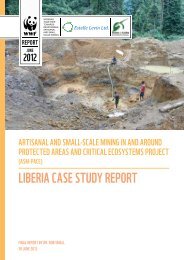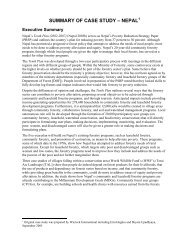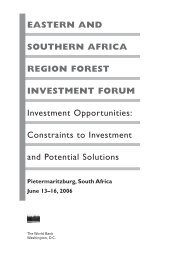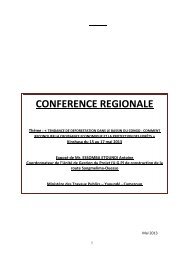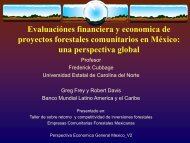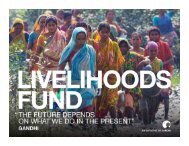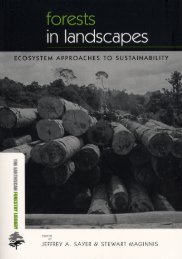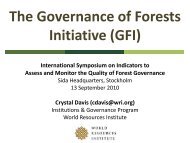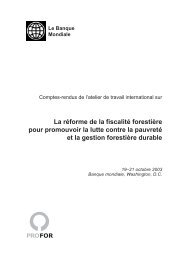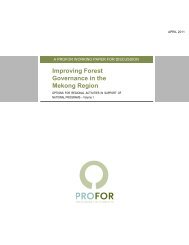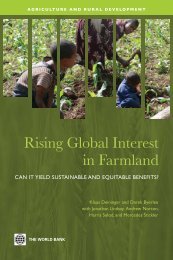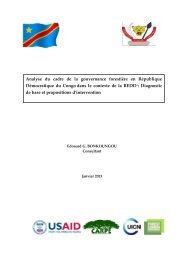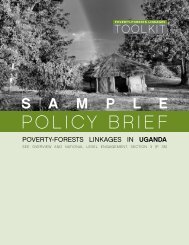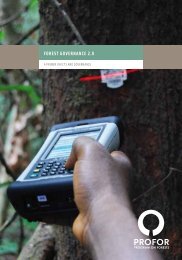The Rainforests of Cameroon - PROFOR
The Rainforests of Cameroon - PROFOR
The Rainforests of Cameroon - PROFOR
- No tags were found...
Create successful ePaper yourself
Turn your PDF publications into a flip-book with our unique Google optimized e-Paper software.
4 <strong>The</strong> <strong>Rainforests</strong> <strong>of</strong> <strong>Cameroon</strong>Forest harvest rights are now granted in a more regulated andpublic way.<strong>The</strong> types <strong>of</strong> industrial harvesting rights and the way they are granted arefundamentally different now as a result <strong>of</strong> the reforms. Long-term rightsto forest management units (unités forestières d’aménagement, or UFAs),which are required to be harvested selectively and managed sustainably,have replaced short-term permits to harvest both small and large forests.<strong>The</strong>se harvesting rights are no longer awarded at the discretion <strong>of</strong> government<strong>of</strong>ficials. A new public auction system, overseen by an independentobserver for the allocation <strong>of</strong> titles, requires the winning firm to proveit possesses sound technical capacity to manage a UFA and to <strong>of</strong>fer thehighest bid. Firms with a record <strong>of</strong> forest infractions are excluded frombidding. Short-term permits to harvest and sell timber from much smallerareas than UFAs, known as ventes de coupe, are also issued by auction.Competition engendered by the auctions has helped increase the sumsthat companies pay to access forests (the area tax) from a base <strong>of</strong> $0.60per hectare per year in 1990 (set administratively) to averages <strong>of</strong> $5.60per hectare per year for UFAs in 2006 and $13.70 per hectare for ventesde coupe in 2005. <strong>The</strong> bidding process attracted new and more environmentallyand fiscally responsible investors to <strong>Cameroon</strong>.Community and local governing councils’ rights to manage forestshave also been established within limits defined by the zoning process.<strong>The</strong> reforms have brought significant achievements.• A relatively well-conserved forest resource. With more than 60 percent<strong>of</strong> its forests under biodiversity conservation, forest management plans,and community and local council forests, <strong>Cameroon</strong> is well set to maintaina permanent forest estate <strong>of</strong> 8 million hectares. Illegal logging inpermanent production forests has been reduced, although it persistsin rural areas. <strong>The</strong> combined timber harvest from legal sources is estimatedto have fallen by about 1 million cubic meters compared with1997, following constraints imposed by the implementation <strong>of</strong> the newmanagement plans. Degradation <strong>of</strong> the permanent forest is declining.Illegal logging by small operators has emerged as a new and problematictrend. Even so, the Delivered main drivers by <strong>The</strong> World <strong>of</strong> deforestation Bank e-library to: are the expansion <strong>of</strong><strong>The</strong> World Banksubsistence agriculture, insecure IP : 192.86.100.34 land tenure, and other issues outsidethe forest sector—where Mon, the 09 primary Nov 2009 solutions 17:06:18 also reside.• Deforestation has been contained. <strong>The</strong> most recent and authoritativestudies on deforestation conducted by the European Commission’s(c) <strong>The</strong> International Bank for Reconstruction and Development / <strong>The</strong> World Bank


